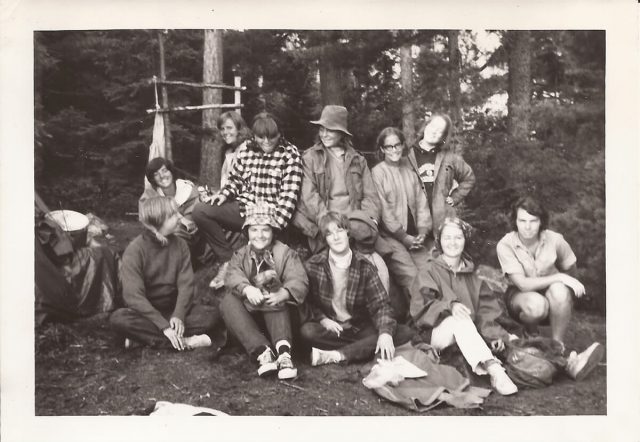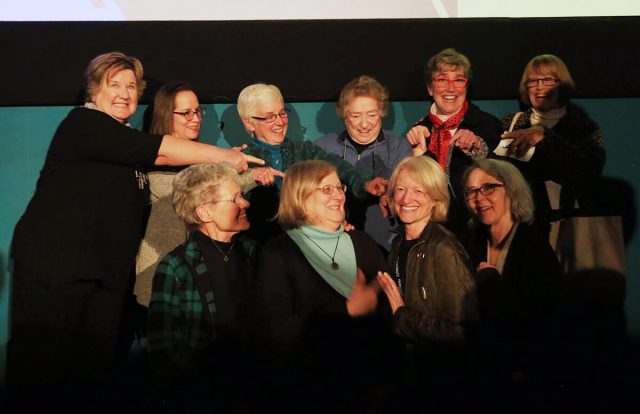By Julie Pfitzinger | Senior Editor for Features | Next Avenue
Filmmaker Maxine Davis recalls the moment when she first learned about an opportunity that would impact her life both personally, and later professionally. The year was 1965, and while in the family car, Davis heard a woman on a Minneapolis radio station talking about the chance for young women to attend an Outward Bound School course in the Boundary Waters Canoe Area (BWCA)near Ely, Minn.
“I was going into my senior year in high school and I thought this just sounded very cool,” Davis said.
That summer, Davis became part of the first group of 24 young women (plus four female instructors) to attend a 28-day survival school at Outward Bound.
The group’s experience, and their 2012 reunion 47 years later when the women were in their 60s, is the subject of Women Outward Bound an award-winning documentary by Davis airing on more than 270 PBS stations around the country this month.
Originally founded in Wales in 1939 to encourage “physical fitness, enterprise, tenacity and compassion” among young men, Outward Bound launched in the United States in 1962. To date, more than 7 million young women and men worldwide have participated in Outward Bound programs.
In the summer of 1965, the young women, ranging from age 15 to 23, were from all over the country. None of them knew each other. According to Davis, their expectations of what was ahead varied. Some thought they were attending a traditional summer camp; a few others from Colorado, whose brothers had experienced Outward Bound, were told by their siblings, “There’s no way you can do this.”
The young women first had 10 days of survival training at what was called Home Place, where they learned skills including orienteering (or navigation), canoeing, portaging (carrying watercraft or cargo over land), building a campfire, cooking and first aid. Then, they were sent out in two brigades of 12 members each, along with two instructors, into the primitive BWCA.
Into the Wilderness

“There were no campsites set up, there were miles and miles of trails; all that’s there are trees and water,” said Davis. It was when the young women entered the wilderness that the hard work and the now-classic Outward Bound need for cooperation began in earnest.
“You have to remember, this was before Title IX, so most of us had never been part of a team before. We had to work together and learn together,” Davis said.
When asked if there was squabbling among the campers — many were teenagers, after all — Davis said there simply wasn’t time for disagreements.
“There was a lot of complaining and commiserating — ‘I’m wet, I’m cold, I can’t go on’ — but of course, we had to keep going. We all had jobs to do,” said Davis. “I know that I cried a lot and I felt sorry for myself.”
A Level Playing Field
Cathy Crowson thought she was going to camp “to ride horses and make S’mores” and didn’t realize the nature of Outward Bound.
“My mom entered me into a contest and I won,” said Crowson, who was 15 at the time. “I didn’t know what I was in for, but I didn’t want the other girls to know that. I learned to keep my cool and just figure it out. That’s something I’ve come back to many times in my life.”
One of the things Crowson found most valuable was that the experience “stripped away all the junior high/early high school behavior. No one cared about clothes, no one looked good,” she said. “It didn’t matter if someone was wearing a madras shirt — we were all up to our necks in mud.”
Asked whether they felt a profound sense of accomplishment on the last day, Davis said matter-of-factly, “We just wanted to go to town to get ice cream. We went to the nearest restaurant and ordered malts.”
“And I was anxious to get home to my boyfriend,” said Crowson.
A Time for Reconnecting
The sense of pride in their accomplishment would arrive later in life when the women reflected on their Outward Bound experience, as a group and then on film, after Davis first conceived of the idea for a reunion.
“I wanted to get everyone together, I wanted to see where they were in their lives,” said Davis, founder of Every Life is a Story, an award-winning production company focused on video biographies and short films.
Even with the advent of online research, tracking down her fellow students proved challenging. Many had married and had different last names. Providentially, Davis learned that a former Outward Bound instructor had saved all their application forms which contained information about schools and the like. If not for that, the documents would have likely been destroyed in a 1967 fire at Home Place.
One by one, Davis made calls. “Everybody went berserk,” she said. “All of them told me how significant the experience had been in their lives.”
However, it was a conversation with one of the former Outward Bounders named Rosie that truly set the project in motion.
“I told her that I was thinking about putting together a reunion,” said Davis. “She told me, ‘Well, you better hurry, because I will be dead in a month.’ She had cancer.”
Davis packed her video camera and headed to Little Rock, Ark., to meet up with Rosie and film their conversation. Featured in the documentary, the woman, who died not long after their meeting, told Davis how she’d always been taught that “girls don’t camp, but I learned different.”
Davis realized the story of the 1965 Outward Bound experience was one that needed to be told.
Reunited at Outward Bound

In 2012, Davis invited the women to gather at her Minneapolis home before they traveled together to what is now called the Voyageur Outward Bound School, where they spent four days.
“The Outward Bound board was very generous and paid for those who initially said the trip was an expense they couldn’t afford,” said Davis, who raised funds separately for the film.
Wanting to be a full participant in the reunion, Davis hired Nick Clausen, a young outdoor filmmaker, to document the trip.
“He knows how to be a fly on the wall,” said Davis, who praised Clausen for capturing compelling footage of their activities, as well as conversations with the women about the impact of the original experience.
Clausen’s work, along with promotional film Davis obtained from the 1965 girls’ program, was used to create the hour-long Women Outward Bound, which Davis co-produced and wrote with filmmaker Melody Gilbert.
Since its debut at the Minneapolis-St. Paul International Film Festival in 2016, Women Outward Bound has won several awards including Best Feature Documentary at the Chagrin Documentary Film Festival, Best Film from the Milwaukee Women’s Film Festival and Best Feature at the Maine Outdoor Film Festival.
Making an Impact
Lynn Cox was an instructor for Davis’ brigade and only a few years older than the students at the time. She and her husband, both teachers, worked at Outward Bound during the summer for several years. For Cox, seeing the women again was particularly gratifying.
“There was a very honest sharing of life’s journeys. There were the commonalities we talked about around aging gracefully,” said Cox. “Many of them have been through some tough times, but they risked self-disclosure and had the courage to talk about their experiences.”
Davis is glad the film has become part of a broader conversation about equality. “I think it’s a seed to talk about what’s happening now, and why what we accomplished is still important,” she said.
At a screening of the documentary several months ago, Cox recalled being struck by a comment made by a middle-school girl during the Q and A session.
“She raised her hand and said, ‘I didn’t know that women weren’t allowed to do those things,” said Cox.
![]() This article originally appeared on Next Avenue
This article originally appeared on Next Avenue
© Twin Cities Public Television - 2018. All rights reserved.
Read Next



